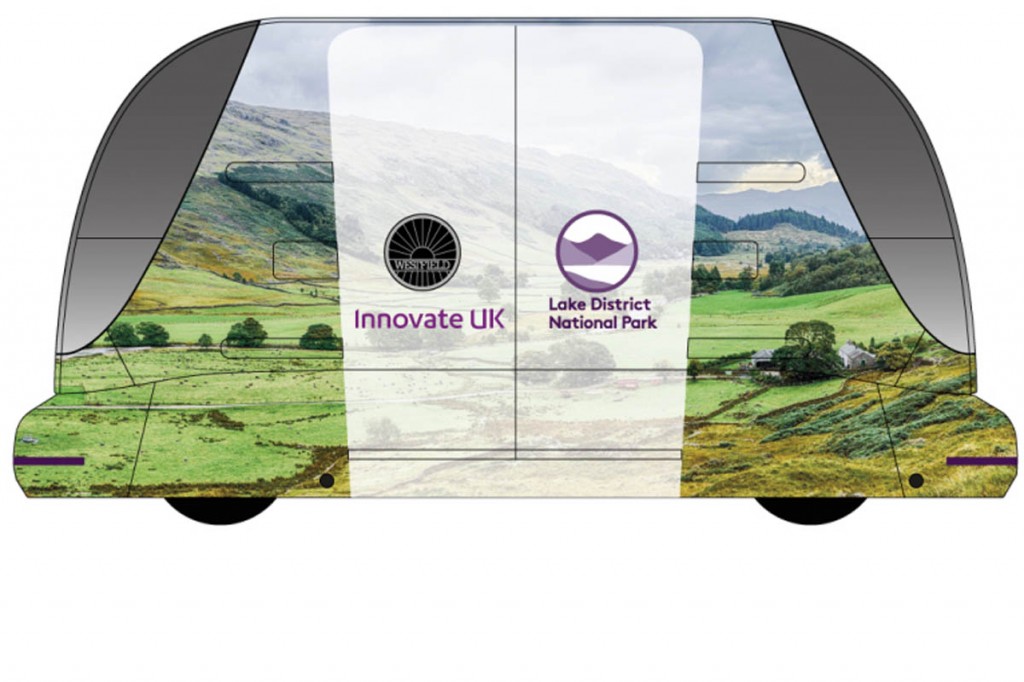Visitors to the Lake District will be able to get a glimpse of the future when a driverless ‘pod’ makes its debut in the national park.
The self-driving vehicle is being examined as a possible way of transporting people round the area.
Westfield Technology Group, which has developed the automated pods, will bring one of the vehicles to the Brockhole visitor centre this weekend as part of a feasibility study with the national park authority.
It will be the first such study in a UK national park and Unesco world heritage site.
The driverless pods are electric self-driving vehicles, meaning no driver or steering wheel is required. Westfield said the pods use advanced technology, including sensors to detect road conditions and obstacles in the road, to transport people in a safe and environmentally friendly way.
The pods are being trialled as a potential solution to the problems of providing sustainable solution to the park’s transport needs for visitors and residents.
Richard Leafe, chief executive of the Lake District National Park Authority, said: “We’re constantly looking at new ways to balance the needs and enjoyment of people as they visit and move around the Lake District, while being mindful of the impact on the environment.
“Driverless pods are a really interesting concept and while this is not necessarily something that will be seen on the Lake District streets soon, it’s vital we explore a range of solutions to sustainable travel.
“We’re excited to see the pods in action this week and to hear from the public on whether they would use this type of transport in the Lake District.”
One of the vehicles will be demonstrated within the grounds of Brockhole, near Windermere, on Friday and Saturday this week. Visitors will be asked to share their thoughts on the sustainable transport type and whether they feel it will be effective in the Lake District, as part of the feasibility study, which is funded by Innovate UK.
Westfield said the pod is the UK’s first fully autonomous vehicle for ‘first mile to last mile’ transportation. It has been developed in conjunction with Heathrow Airport and uses the base technology platform from the work completed by ULTra PRT (Personal Rapid Transit). The original system has now completed more than 5 million kilometres in a live commercial environment serving Heathrow Airport Terminal 5 pod parking.
Julian Turner, Westfield Technology Group chief executive, said: “We’re really excited to be trialling the pods in the Lake District, which is such a popular tourist destination in the UK.
“Through this project we’re identifying possible routes for the pod and talking to the local community about how we could meet their transport needs. This collaborative effort will allow us to creative a sustainable and accessible transport mode for journeys in the future.
“We’re particularly looking forward to hearing feedback from the local residents and visitors at Brockhole, as their input into how services can help meet their needs will be invaluable when planning possible routes for the pod to run in this area”
The results of the feasibility study, which is due to end in June, will inform whether this type of transport would be suitable in the Lake District and which routes would be viable for vehicle travel.
The pod will be at Brockhole from 1pm to 4pm on Friday and 10am to 4pm on Saturday.


Wainwrightwalker
25 April 2018A driverless pod transporting people around Lake District...
Has Richard Leafe lost his mind??
Where roads are straight, wide and uncomplicated, this may be an option.
But in the Lakes.....
I think Richard needs to be the first passenger, on a round trip, including Honister, Wrynose, Hardknott Passes, a couple of diversions around Wast Water and Haweswater. These are places where you are not looking at traffic 50 feet in front of you, but at times 1/2 a mile ahead as a human knows what’s coming, super narrow bits, horrible and insanely cambered corners, that flock of sheep or cows which are wandering towards the road ahead and of course, drivers who do not have a clue...
If he thinks after his trip, that it is safe, and it will not employ its algorithm and off-Road him, then roll it out, but this will result in accidents, and I suspect, many lawsuits aimed at the LDNPA for authorising it.
E.Musk
25 April 2018Be fun going over Hardknott in one!
TH
25 April 2018Will these be replacing the 4x4s on the High Tilberthwaite track?
Northern Bloke
25 April 2018had to check the date first!
Another half baked scheme designed with nobody in particular in mind. It's about time the LDNPA started to really look at what they're trying to achieve, deliver something meaningful for the inhabitants as well as visitors!
TARS
26 April 2018It might be hard to comprehend currently, but this technology will eventually evolve to the point where it will be feasible to use it as proposed. Personally, as long it's safe (nothing is ever 100% safe! ) it can't come quick enough in my view. When the motorcar was first invented there were similar concerns about safety but these were largely swept aside due to the phenomenal appetite for car ownership. This scenario is no different, there is a huge demand for fully automated transport systems, and although there will undoubtedly risks (and deaths), generally speaking over time these will become acceptable in the same way RTA's are currently.
James R
26 April 2018This could be great. Coming from London to the Lakes I’d prefer the train as quicker and for all the other reasons. Problem in the Lakes is then that you are limited to visits/walks accessible from public transport - good as it is - inevitably there are a lot of places it can’t reach and times of buses etc are a limiting factor. Car hire is essentially unavailable locally at times/locations that make sense (although I think I’d heard that someone is trying to set up a car share club at Windermere station). These self driving pods could get the train traveller to exactly where they want to start their walks etc and with no parking issues. Once developed, I’d expect the self driving car to be much safer than human drivers...
Sheepy
26 April 2018One thing you can guarantee about this. Someone somewhere will end up making a mint out of taxpayers from it.
Mark
01 May 2018Whether driverless or not, surely electric vehicles should be a priority to replace the smelly diesel buses on shorter, high traffic routes such as between Ambleside and Dungeon Ghyll or Keswick and Seatoller?
Hardknott and Wrynose passes are currently bus routes for fairly obvious reasons and I can't see that changing, but who knows?
Personally I think your bus drivers are great ambassadors for the park, so make sure they are looked after.